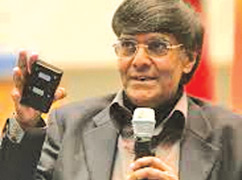|
Building a sustainable future:
Engineers have a key role to play
By Gamini Warushamana
Engineers have a key role in building a sustainable future in the
backdrop of emerging issues related to unbalanced development taking
place today, ignoring the social and environment aspects of development,
Prof. Mohan Munasinghe told the 108th annual sessions of the Institute
of Engineers of Sri Lanka (IESL) in Colombo last week.
 Prof. Munasinghe, a Sri Lankan physicist, academic and economist,
specialises in energy, water resources, sustainable development and
climate change. Prof. Munasinghe, a Sri Lankan physicist, academic and economist,
specialises in energy, water resources, sustainable development and
climate change.
He said that as a result of the widening inequality in income
distribution and resulting poverty and frequent economic and financial
shocks, the development we are experiencing today is not sustainable.
Global consumption of resources is ecologically imbalanced.
We need to balance it to make our development path more sustainable.
Around 1.4 billion of the richest 20 percent of the world's population
consume over 80 percent of global output, or 60 times more than the
poorest 20 percent. In balancing this, engineers have a role in finding
solutions for efficient consumption of resources, he said.
As a result of poor decision-making, climate change, food and water
shortages are creeping in on us.
In reality, there are three levels in development. We only look at
financial markets and economic growth which are on the surface. The
social issues and environmental issues too should be addressed to make
development more sustainable, he said.
Economic recessions are caused by the collapse of a greed-driven
asset bubble which inflated financial values well beyond the true value
of underlying economic resources. Social bubbles are based on poverty
and inequity that is growing despite economic growth, excluding billions
of the poor from access to productive resources and basic necessities,
such as food, water and energy. Mankind faces the bubble of
environmental harm and resource shortages, due to myopic economic
activities that severely degrade natural assets (air, land and water) on
which human well-being ultimately depends.
Climate change is just one grim global manifestation of this threat
and ironically, the worst impact will fall on the poor who are the least
responsible for the problem. Unfortunately, human response to the issues
has been uncoordinated and inadequate, Prof. Munasinghe said.
He said that governments of the rich world quickly found trillions of
dollars for stimulus packages, to bail out financial institutions but
not the millions of dollars that are needed per year to alleviate
poverty or the need to combat climate change.
He said that wars fought by developed countries are not for disarming
weapons of mass destruction, but for oil, water or mineral resources.
The rich world is responsible for over 80 percent of carbon emission.
Engineers need to innovate new efficient resource consumption methods to
reduce carbon emission of the developed countries without compromising
the living standards they lead today.
Innovation can lead middle income countries to reach the same level
of living standards and development but not through the same path the
developed countries passed, damaging the environment and widening social
inequality and issues, he said.
|

